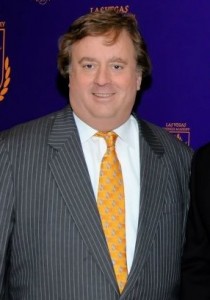 Boston Mayor Martin Walsh isn’t getting off the hook so easily. He tried to fob the negotiation of a mitigation agreement with Wynn Resorts off on the Massachusetts Gaming Commission. The latter said ‘not so fast’ and ordered the city back to the bargaining table. And if that doesn’t work, the MGC will appoint an independent arbiter to cut the Gordian knot. “The city’s basically, without telling us why, said they’re … just abandoning that [Charlestown] section of the city,” explained Commissioner James McHugh. “We have some obligation to protect it. At the same time, we’ve got to maintain our neutrality.”
Boston Mayor Martin Walsh isn’t getting off the hook so easily. He tried to fob the negotiation of a mitigation agreement with Wynn Resorts off on the Massachusetts Gaming Commission. The latter said ‘not so fast’ and ordered the city back to the bargaining table. And if that doesn’t work, the MGC will appoint an independent arbiter to cut the Gordian knot. “The city’s basically, without telling us why, said they’re … just abandoning that [Charlestown] section of the city,” explained Commissioner James McHugh. “We have some obligation to protect it. At the same time, we’ve got to maintain our neutrality.”
While somewhat craven, Walsh’s refusal to go to arbitration and risk the 50-50 chance of being stuck with the Wynn offer is understandable. While  Mohegan Sun is offering an extra-george $30 million upfront and $18 million a year, Wynn has only put $6 million and $2.6 million, respectively, on the table. There’s no comparison, so one can see why Walsh would fear to be stuck with the Wynn offer, if that were the case — especially if Steve Wynn had the winning project this fall. His rationale appears to be that the magnitude of his investment — $1.6 billion — precludes the need for lavish surrounding-community deals.
Mohegan Sun is offering an extra-george $30 million upfront and $18 million a year, Wynn has only put $6 million and $2.6 million, respectively, on the table. There’s no comparison, so one can see why Walsh would fear to be stuck with the Wynn offer, if that were the case — especially if Steve Wynn had the winning project this fall. His rationale appears to be that the magnitude of his investment — $1.6 billion — precludes the need for lavish surrounding-community deals.
“The commission has the power to strip Boston of its status as a surrounding community, but can still require Wynn to pay Boston an annual impact fee and impose any requirements it deems appropriate,” reports the Boston Herald. However, given the amount of criticism it has drawn, the MGC is clearly reluctant to flex its muscles unless absolutely necessary.
* Caesars Entertainment was accused of an “endless shell game” by  dissident bondholders. But that wasn’t enough to keep the Illinois Gaming Board from approving a $1.75 billion restructuring, removing the last obstacle to the deal. According to CEO Gary Loveman, bankers are lining up around the block to get in on the refinancing, which he characterized as oversubscribed. Plaintiffs’ attorney Sidney Levinson lamented, however, “The financing transaction will, in our view, ultimately pave the road for [Caesars’] bankruptcy rather than forestall it.”
dissident bondholders. But that wasn’t enough to keep the Illinois Gaming Board from approving a $1.75 billion restructuring, removing the last obstacle to the deal. According to CEO Gary Loveman, bankers are lining up around the block to get in on the refinancing, which he characterized as oversubscribed. Plaintiffs’ attorney Sidney Levinson lamented, however, “The financing transaction will, in our view, ultimately pave the road for [Caesars’] bankruptcy rather than forestall it.”
Meanwhile, overseas, it looks as though Caesars’ megaresort project in South Korea won’t pencil out unless the laws are changed to allow citizens, not just tourists, to play. Caesars is committing itself to a $794 million project in a country where foreigner-only casinos average less than $78 million a year. But if that’s bad for Caesars, it’s worse for Genting Group, which is contemplating a $2.2 billion Korean investment.
* In Mississippi, a jurisdiction where Caesars has struggled of late, the casino industry is the state’s third-largest employer and generates $258  million tax dollars a year. But industry leaders aren’t feeling the love. Tunica Convention & Visitors Bureau CEO Webster Franklin placed the blame for the closing of Harrah’s Tunica on the state. “Mississippi has never truly acknowledged the gaming industry. Leadership has never done anything to hurt it, but they haven’t done anything to help it either,” he complained, not without some justification. (It took the catastrophe of Hurricane Katrina to get Gulf Coast casinos moved onto the land.)
million tax dollars a year. But industry leaders aren’t feeling the love. Tunica Convention & Visitors Bureau CEO Webster Franklin placed the blame for the closing of Harrah’s Tunica on the state. “Mississippi has never truly acknowledged the gaming industry. Leadership has never done anything to hurt it, but they haven’t done anything to help it either,” he complained, not without some justification. (It took the catastrophe of Hurricane Katrina to get Gulf Coast casinos moved onto the land.)
Franklin added, unfortunately without any specific policy nostrums, “We need to sit down and figure out what we can do so this doesn’t happen again. That’s got to happen.” If Webster wants the state to come to the aid of the casino industry, it might help if he put some concrete proposals on the table, just to get the discussion started.

